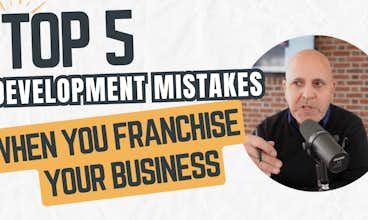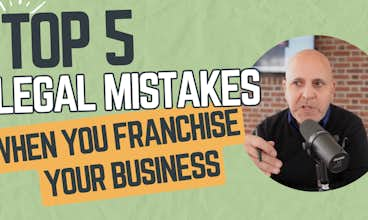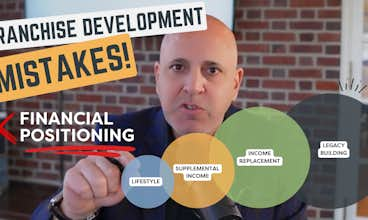Franchisor and Franchisee Differences
Defining the roles and responsibilities of key players in a franchise can improve business relationships – and lead to success.
Before selling your first franchise – or buying your first franchise business – it’s important to understand the role you’ll be playing in the franchise system.
From knowing who is responsible for training and marketing expenses to understanding your legal obligations under the franchise agreement, defining the role of the franchisor and franchisee can prevent confusion and keep daily operations running smoothly. Whether you’re selling franchise opportunities or investing in a business, making sure your role and responsibilities are clear early on can strengthen the franchisor-franchisee relationship and prevent future legal issues from arising – something that can clear the path for franchising success.
The roles of a franchisor include:
Having a Proven Business Model
Registering a Trademark
Establishing Business Systems
Proprietary Market Knowledge
Vendor Relationships
Training and Pre-Opening Support
Provide Ongoing Assistance
The roles of a franchisee include:
Paying initial and Ongoing Fees
Being Responsible for Day-to-Day Operating Expenses
Maintaining Brand Standards
Following Established Systems
Managing and Developing Franchised Locations

Read on to find out more about the responsibilities of franchisors and franchisees, and learn about the differences between each role when it comes to developing and operating a franchise.
What is the role of a franchisor?
A franchisor is typically an entrepreneur who has laid the groundwork to create a successful, established business. Pursuant to a Franchise Disclosure Document (FDD), a franchisor offers and sells franchises to prospective franchisees.
Responsibilities of a Franchisor
Under the Federal Trade Commission’s Franchise Rule, the responsibilities of a franchisor must be disclosed to franchisees within the FDD. Because a franchisor’s obligations to franchisees might include additional, optional responsibilities that go beyond what is required by law, a franchisor’s responsibilities must also be described within the franchise agreement. Although the specific obligations of a franchisor can vary based on their industry and business, the following are common responsibilities of most franchisors:
A Proven Business Model
To become a franchisor, you must have reached a point in which your business model irrefutably works. Consumers recognize your brand and seek out your products or services.
A Recognized Trademark
Registered trademarks are among the most valuable assets that a franchisor has acquired through careful research as well as trial and error. Establishing a recognized trademark and securing federal rights to that mark often requires a great deal of time and dedication.
Established Business Systems
As a successful entrepreneur with a proven business model, you’ve developed a system of conducting business that produces reliable results. From working with customers and clients to delivering products and services consistently, the franchisor has an established business model that franchisees will follow.
Proprietary Market Knowledge
Throughout the process of developing a successful business, franchisors acquire a high level of industry expertise. They know who their customers are, where they live – and what they want. They also know how to sell those goods and services in a way that is consistent with their brand and appeals to their target demographics.
Vendor Relationships
As a seasoned and successful entrepreneur, the franchisor can connect its franchisees with quality vendors – ideally, at affordable prices.
Training and Pre-Opening Support
One of the most important contributions that the franchisor provides is extensive training and pre-opening support. With the guidance of an experienced entrepreneur, the franchisees learn from someone with proven success.
Ongoing Assistance
In addition to training and pre-opening support, most franchisors provide ongoing business assistance to franchisees after a franchise location opens. These responsibilities vary between franchise systems but usually include marketing assistance and business development support. The franchisor’s assistance obligations, including pre- and post-opening support, are described in the franchise agreement and disclosed within Item 11 of the FDD.
What is the role of a franchisee?
A franchisee, through a franchise agreement with the franchisor, is granted the right and obligation to establish and operate a franchised location. Franchisees typically pay franchisors a one-time upfront franchise fee and ongoing royalty fees in exchange for the right and obligation to establish a franchised location using the franchisor's systems, know-how and licensed marks.
Responsibilities of the Franchisee
A franchisee's role is to duplicate the franchisor's successful business model in order to help it expand into a regional or national market. It is not a passive role, by any means, and requires significant investment and work. Like the franchisor, a franchisee’s responsibilities must be clearly described in the franchise agreement and the FDD, specifically within Item 9. Although the specific obligations of a franchisee will vary between franchise systems, the following are typical responsibilities of most franchisees:
Paying Initial and Ongoing Fees
Franchisees are required to pay a franchise fee in order to obtain the right to establish a franchised business location as well as royalties, a percentage of gross revenues and a fee for advertising costs.
Operating Expenses
As business owners, franchisees are responsible for paying for the day-to-day operating expenses of their franchise business. This includes expenses like paying employees and managers, rent, business taxes and other costs related to operating the franchise location.
Maintaining Brand Standards
Because franchisees represent an established brand and operate under a licensed trademark, it’s their responsibility to maintain the brand’s standards and reputation. This includes offering products and services that are consistent with brand standards.
Following Established Systems
One of the benefits of being a franchisee is having a specific set of established systems to follow for success. Franchisees are obligated to follow the operations and procedures established by the franchisor, which are typically outlined in the franchise operations manual.
Management and Development of Franchise Location
Franchisees take the franchisor's business systems, training and know-how and put it into practice in their location. Franchisees essentially have a framework for making their franchise location a success, but control the day-to-day operations independently.
Although the franchisor and franchisee each play very different roles in the franchise system, they are equally important to its long-term success. By defining and understanding each party’s responsibilities, franchisors and franchisees can keep daily operations running smoothly while strengthening their business relationship and preventing future issues.
Before starting a franchise or purchasing a franchise, it is critical to understand the role of both parties in the franchise system. To learn more about franchising, contact us at (800) 976-4904.








